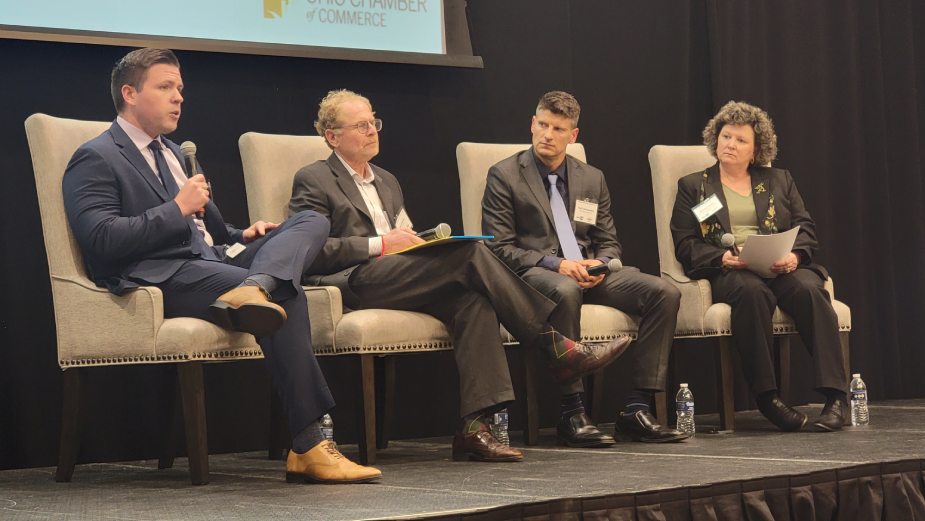Ellwood Aluminum Navigates Manufacturing Science
HUBBARD, Ohio – Lauren Homack began to look at a career in engineering when she was in middle school. But her career path took an unexpected turn when a materials science course in college landed her an internship with a steel manufacturer.
Manufacturing wasn’t on her radar until a few classmates began internships with a manufacturer and she decided to give it a try.
“I wasn’t expecting to like heavy manufacturing so much. But it’s exciting,” Homack says. “It’s very challenging and there’s always something new and interesting going on.”
After graduating from Case Western Reserve University, where she earned a baccalaureate in materials science and engineering in 2019, Homack completed a metallurgical engineering development program with Ellwood Aluminum. In January, she began full-time work at the Hubbard aluminum casting shop as a metallurgical engineer.
Ellwood, which made its first aluminum cast in June 2020, is coming out of its startup phase, giving Homack and her co-workers a chance to be on the ground floor of something new.

The Business Journal spoke with Homack and others during a visit to Ellwood Aluminum as part of the Brain Gain Navigators career exploration series.
Ellwood Aluminum is an operating unit of the Ellwood Group, based in Ellwood City, Pa. The company employs more than 2,000 across more than 25 sites in the United States, Canada and Mexico.
In June 2018, the company broke ground for construction of a $60 million aluminum cast house adjacent to an existing building of Ellwood Engineered Castings.
The 105,000-square-foot project was completed in May 2020. The plant can produce aluminum ingots of up to 360 inches and has a 55-ton melting and holding combination furnace, as well as two 40-ton cranes built to handle oversized products.
In February 2021, the plant produced a 95,000-pound slab for Wagstaff Inc. – the largest ever produced in North America at the time. This month, Ellwood Aluminum reported it shipped the first ingots produced by the plant for aerospace applications.
Workers operate machinery and saws to cut products to customer specifications, says Hank Stull, human resources/safety specialist. All of the equipment is new and Ellwood trains its employees, even if they have no manufacturing experience, he says.
Nate Hayes, a casting operator, has been with the company only a few months since his graduation from Poland Seminary High School. Learning to work the equipment, like the casting table, can be challenging, he says. “But once you get the hang of it, you’ll be just fine.”
Hayes says he always wanted to pursue manufacturing as a career.
“I’m not really a college guy and I heard this was a newer company. So I thought, ‘Give it a shot,’ and I really like it,” he says. “Everyone here is willing to help. They’re friendly.”
Candalynne Fredericks brought some factory experience to Ellwood Aluminum, where she’s worked as a finishing operator for a little over a year. Coming in, she had no knowledge of how to operate a crane, she says. But now she runs the crane daily – bringing material to the saw, making measurements, cutting it to spec and inspecting the finished product.
“One good thing with our company is they will teach you. If you want to learn, the sky’s the limit,” Fredericks says. “They definitely teach you more to advance.”

Ellwood instructs its workers in the basics of metallurgy, which is important in producing quality aluminum, says Scott Gregory, Ellwood Aluminum general manager. Products made from the aluminum produced at Ellwood are the type of things that “if it breaks in the field, we tend to make the news,” he says. “So we’d rather not have any kind of failure out there.”
In the quality department, Homack and her co-workers ensure the chemistry of the aluminum matches customer specifications. Working with her team to solve a problem is the most rewarding part of the job, she says.
“I love working with our operations crew and our quality department and our engineers to make sure that what we’re giving the customer is exactly what they want,” Homack says.
Part of Ellwood’s success is hiring a workforce “that wants to learn, that can take ownership of the process,” Gregory says. A college education isn’t required to work at Ellwood Aluminum, he says. Employees can acquire the skills and safety awareness they need at a trade school.
“And Ellwood is promoting that,” he says. “For people that want to work along that pathway, we offer tuition reimbursement for those schools to develop those skills.”
Ellwood Aluminum also offers tuition reimbursement for employees who go back to school to advance their education or transition to another department, such as engineering or accounting. It’s a program Gregory says he took advantage of to earn an MBA from Youngstown State University in 2020.
“[President Patrick Callihan] is a big believer in having education and also developing people,” Stull says. “On the Ellwood Engineered Castings side, our operations manager started out on the floor. He went back to school and now he’s the operations manager.”
Reimbursement depends on an employee’s grades. A’s and B’s are 100% reimbursed, while C’s are reimbursed 75%. The company also pays for books. Since 2014, seven employees have taken advantage of the program and still work for Ellwood.
“If you have an interest that pertains to the growth of the company or along company lines and you want to attend a trade school or a college program, we encourage that with tuition reimbursement,” Gregory says. “It’s a benefit for everyone when people grow and learn. Because that provides opportunity and more avenues for advancement within the company.”
That advancement can include administrative tasks or roles within the sales department, he says. Some individuals have advanced into the metallurgy side of the company, which is deeply rooted in chemistry.
Gregory himself gravitated toward metallurgy – now called materials science and engineering – after being exposed to manufacturing at a young age by his father, who was a maintenance engineer and electrical engineer for a foundry in Sandusky. In the early 1980s, Gregory’s father took him to the shop to observe the work.
“Since I’ve been in junior high school, I’ve been around molten metal and I’ve always been intrigued to see what you can do with it,” says Gregory, who holds a bachelor’s degree in metallurgy engineering.
Ellwood employees can expect to work in a hot environment some days, he allows. Ideal employees are those who work safely and are willing to learn.
“You don’t always understand everything that goes on. You’re always learning something new with this process,” he says. “Even at my experience level.”
Safety is paramount. Workers wear hearing, eye and face protection, along with other required personal protective equipment. Ellwood differentiates itself from manufacturing practices in the past, he says.
“The truth is, if we put quality and safety up front, production happens naturally,” Gregory says. “At the end of the day, we all go home the same way as we came in to work, which is a huge change from when I started.”
Students engaged in hobbies that demonstrate a mechanical aptitude could find success in manufacturing, Gregory says, particularly those who excel at math and measurement, hands-on work and “a little bit of three-dimensional working.”
And there will be local jobs waiting for them when they graduate, he says. Ellwood Aluminum has been in “rapid growth” and is hiring casting operators, furnace operators, lathe operators, heavy equipment operators and shipping personnel, he says.
Wages at Ellwood start at $17.50 an hour. Benefits include medical, dental, vision and a 401(k). On average, workers put in 40-hour weeks with overtime opportunities.
“We’re now at two crews, and ultimately, a mill of this type likes to run every single day. We want to get to a four-crew operation in which we basically don’t turn it off 24/7,” Gregory says. “And we’re rapidly trying to expand into that.”
Copyright 2024 The Business Journal, Youngstown, Ohio.


